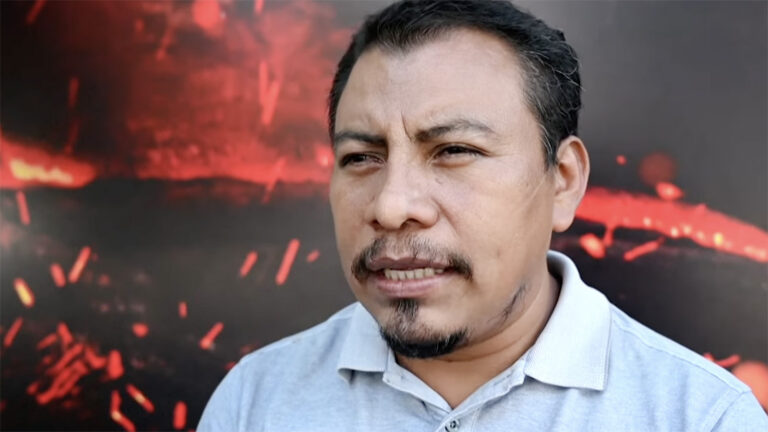
Honduran environmental activist and lay Catholic leader Juan Antonio López was killed Sept. 14, 2024. (Video screen grab)
Catholic leaders throughout the Americas are expressing grief and outrage at the killing of Juan Antonio López, a Honduran environmental activist and local Catholic leader, in Tocoa, in northeastern Honduras, on Saturday (Sept. 14).
López, described by friends as his local bishop’s right-hand man, was shot dead by several men as he left church Saturday night, according to Reuters. The Inter-American Commission on Human Rights said López had recently received threats from a gang member, a Honduran businessperson and a mining company representative.
A member of the Municipal Committee for the Defense of Common and Public Goods in Tocoa, López had advocated against the harmful impacts of an open-pit iron oxide mine. His group had protested that the mine was polluting the Guapinol and San Pedro rivers, which communities in the area rely on for their daily water supply.
In a message addressed to López after his death, Bishop Jenry Ruiz of the Diocese of Trujillo wrote, "You told me that you were not an environmentalist because for you, the social, ecological and political commitment were not an ideological question, but a question of your being of Christ and of the church."
The bishop noted the activist’s understanding of Pope Francis’ environmental teaching and "tenderness and truth" in responding to his detractors. Ruiz wrote too that López knew of the risks. "You knew very well that the extractivist and mining system is a system that kills and destroys the whole world, along with the corruption of the false politicians and the narco-governments."
In a video posted by several Honduran news outlets, the Rev. Carlos Orellana, a Catholic priest in Tocoa, called the killing of López "a death foretold" and accused Tocoa Mayor Adán Fúnez and his "minions" of being responsible for the hit that killed López.
Fúnez told Honduran outlet HRN that he was praying that the truth would be revealed, that his family was in fear due to the accusations and that he had been attacked with stones.
The Honduran Jesuits released a statement also holding the government responsible for López’s death, pointing to officials’ failure to keep mine owners in check and investigate threats against López’s group and punish those responsible for them.
"We demand that the investigation to determine the truth of the facts be carried out with the effective accompaniment of an international commission that guarantees impartiality, diligence and independence to determine the material and intellectual responsibilities in the murder of our comrade and brother Juan Antonio López," the order wrote.
Advertisement
López’s death is the latest in a number of killings in a country known to be particularly deadly for environmental activists. The 2016 murder of Indigenous environmental activist Berta Cáceres drew international attention, but many deaths occur with far less international scrutiny.
Earlier this year, the Organization of American States’ Inter-American Commission on Human Rights expressed alarm at the high rates of assassinations and other violence against environmental and land defenders in Honduras, saying that 17 defenders were assassinated in 2022 and another eight were killed violently in the first four months of 2023.
Outside Honduras, Catholic organizations, including Caritas Canada and the Jesuit European Social Centre, expressed grief at López’s death.
The Latin American bishops’ conference, known by the acronym CELAM, wrote to López’s colleagues and family, emphasizing López’s service as a leader of ecclesial base communities, a pastoral worker, diocesan coordinator and member of the Ecclesial Network of Mesoamerican Ecology (REMAM).
"We emphatically repudiate and condemn all forms of violence, and regrettably the assassination of Juan is a reflection of a small portion of society that is intolerant, unjust and who want to impose their will through force," the conference wrote.
In the U.S., the Sisters of Mercy’s justice team has long argued that extractivist development, violence and corruption in Honduras are among the root causes driving migration to the U.S., asserting that Hondurans should have "the right not to migrate."
The U.S. religious congregation Sisters of Mercy has supported the Guapinol River activists, particularly over the almost three-year period that eight activists, who did not include López, were imprisoned after organizing an encampment to block the local mining company from accessing their roads.
During the protests, which began peacefully, military police killed one civilian and injured eight others. Ultimately, the Honduras Supreme Court ruled that the judge who ordered the men’s detention lacked jurisdiction to do so and threw out the case.
Sister Mary Kay Dobrovolny, of the Sisters of Mercy, said that López had called for Fúnez, the mayor, to resign because of his links to drug traffickers just days before he was killed. Dobrovolny wrote in a statement, "Too many people have died striving to protect the land that they love."
The sister also said that, while visiting Honduras with a solidarity delegation organized by the Share Foundation in 2021, she witnessed the assassination of a man in front of his wife and children. "The wailing of intense grief and shock of his family is a sound that I will never forget," she wrote.
"I join my voice with the loved ones of Juan Lopez and all environmental activists who say the killing must end," Dobrovolny, the congregation’s new membership ministry coordinator, wrote.
As he came to the conclusion of his letter to López, Ruiz, his bishop, wrote, "Dear Juan López, may your blood make the seeds of Kingdom bloom and we have fruits of justice, where a new Honduras is possible."








